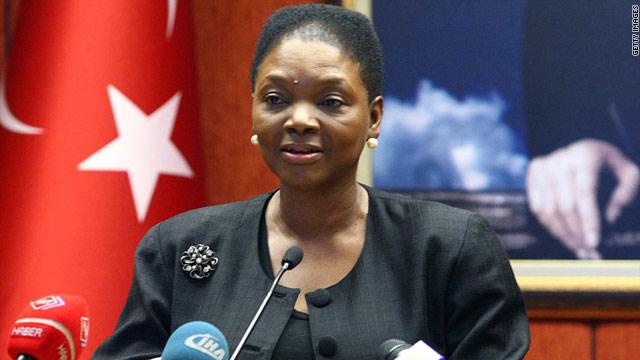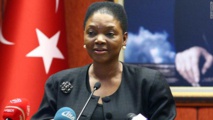"For more than four years, we have watched Syria descend into deeper depths of despair, surpassing what even the most pessimistic observers thought possible," said Amos.
"I know that there are no easy answers or quick fixes," she told the 15-member council.
"We cannot leave Syrians abandoned to hopelessness and further despair."
In the months leading up to her departure, Amos has repeatedly voiced frustration with the Security Council's failure to unite behind measures to ease the suffering of civilians and chart a course for a political solution.
The British diplomat is stepping down after more than four years in one of the most challenging jobs at the United Nations as demands for humanitarian aid have surged in conflicts worldwide.
- Set aside differences -
With more than 12.2 million people in urgent need of aid -- more than half of the country's population -- Syria has been the UN official's top priority and Amos repeated that more needs to be done.
"For the sake of Syria and its future generations, this council must set aside its political differences and come together to find a solution to what appear to be intractable problems," she said.
The death toll from the war has surpassed 220,000, but the Security Council has remained deadlocked over how to address the conflict despite three resolutions adopted last year.
Amos noted that 422,000 people are living under siege in Syria, under dire conditions, and that UN agencies and partner relief organizations have been unable to reach those in need in besieged areas.
She took a swipe at the council, saying that if such a figure had been envisaged at the start of the conflict, council members "would not have believed it possible."
"Today we take it for granted," she said.
UN peace envoy Staffan de Mistura opened consultations in Geneva earlier this month to gauge support for a full-fledged peace initiative after two previous UN efforts failed.
Syrian Ambassador Bashar Jaafari told the council that the crisis in Syria will end when support for "foreign terrorist fighters" is cut off, in a reference to US, Turkish and Gulf support for opposition armed groups.
Amos will be replaced by fellow Briton Stephen O'Brien, a former MP who worked as Prime Minister David Cameron's envoy for the Sahel.
-----------------------------------------------------------------------------------------------------------
"I know that there are no easy answers or quick fixes," she told the 15-member council.
"We cannot leave Syrians abandoned to hopelessness and further despair."
In the months leading up to her departure, Amos has repeatedly voiced frustration with the Security Council's failure to unite behind measures to ease the suffering of civilians and chart a course for a political solution.
The British diplomat is stepping down after more than four years in one of the most challenging jobs at the United Nations as demands for humanitarian aid have surged in conflicts worldwide.
- Set aside differences -
With more than 12.2 million people in urgent need of aid -- more than half of the country's population -- Syria has been the UN official's top priority and Amos repeated that more needs to be done.
"For the sake of Syria and its future generations, this council must set aside its political differences and come together to find a solution to what appear to be intractable problems," she said.
The death toll from the war has surpassed 220,000, but the Security Council has remained deadlocked over how to address the conflict despite three resolutions adopted last year.
Amos noted that 422,000 people are living under siege in Syria, under dire conditions, and that UN agencies and partner relief organizations have been unable to reach those in need in besieged areas.
She took a swipe at the council, saying that if such a figure had been envisaged at the start of the conflict, council members "would not have believed it possible."
"Today we take it for granted," she said.
UN peace envoy Staffan de Mistura opened consultations in Geneva earlier this month to gauge support for a full-fledged peace initiative after two previous UN efforts failed.
Syrian Ambassador Bashar Jaafari told the council that the crisis in Syria will end when support for "foreign terrorist fighters" is cut off, in a reference to US, Turkish and Gulf support for opposition armed groups.
Amos will be replaced by fellow Briton Stephen O'Brien, a former MP who worked as Prime Minister David Cameron's envoy for the Sahel.
-----------------------------------------------------------------------------------------------------------









 Home
Home Politics
Politics











